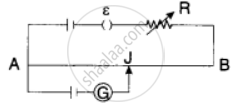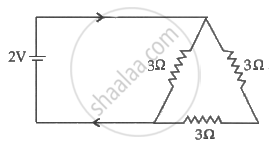Advertisements
Advertisements
प्रश्न
(i) State the principle on which a potentiometer works. How can a given potentiometer be made more sensitive?

उत्तर
(i) Potentiometer is an apparatus used for measuring the emf of a cell or potential difference between two points in an electric circuit accurately.
Principle of potentiometer
The working of potentiometer is based on the fact that the fall of potential across any portion of the wire is directly proportional to the length of that portion provided the wire is of uniform area of cross-section and a constant current is flowing through it.
If V is the potential drop across the portion of wire of length l whose resistance is R. Then
\[V = I \times R = I \times \frac{\rho l}{A}\]
where A, l and \[\rho\] are respectively the area of cross-section, length and specific resistance of the material of the wire.
\[\frac{V}{l} = I \frac{\rho}{A} = K\]
where K is called the potential gradient, i.e. the fall of potential per unit length of wire.
To make the potentiometer sensitive, the potential gradient should be low. So by increasing the length of the wire,potential gradient reduces as it is inversely proportional to the length of the wire and hence in this the potentiometer can be made more sensitive.
(ii) A potentiometer is called sensitive if fall of potential per unit length i.e potential gradient is small. The slope of V-l graph gives potential gradient which is smaller for the potentiometer B than for potentiometer A. Hence, potentiometer B is more sensitive than A.
APPEARS IN
संबंधित प्रश्न
If the potential gradient of a wire decreases, then its length ______
The instrument which can measure terminal potential difference as well as electromotive force (emf) is ______
Sensitivity of a given potentiometer can be decreased by ______.
A potentiometer is used to measure the potential difference between A and B, the null point is obtained at 0.9 m. Now the potential difference between A and C is measured, the null point is obtained at 0.3 m. The ratio `E_2/E_1` is (E1 > E2) ______

A potentiometer wire is 100 cm long and a constant potential difference is maintained across it. Two cells are connected in series first to support one another and then in opposite direction. The balance points are obtained at 50 cm and 10 cm from the positive end of the wire in the two cases. The ratio of emf's is ______.
AB is a wire of potentiometer with the increase in the value of resistance R, the shift in the balance point J will be ______.

The value of current I in the network shown in fig.

A wire of resistance R is cut into two equal part. There parts are then connected in parallel. The equivalent resistance of the combination will be
If you are provided a set of resistances 2Ω, 4Ω, 6Ω and 8Ω. Connect these resistances so as to obtain an equivalent resistance of `46/3`Ω.
What is the internal resistance of the cell?
